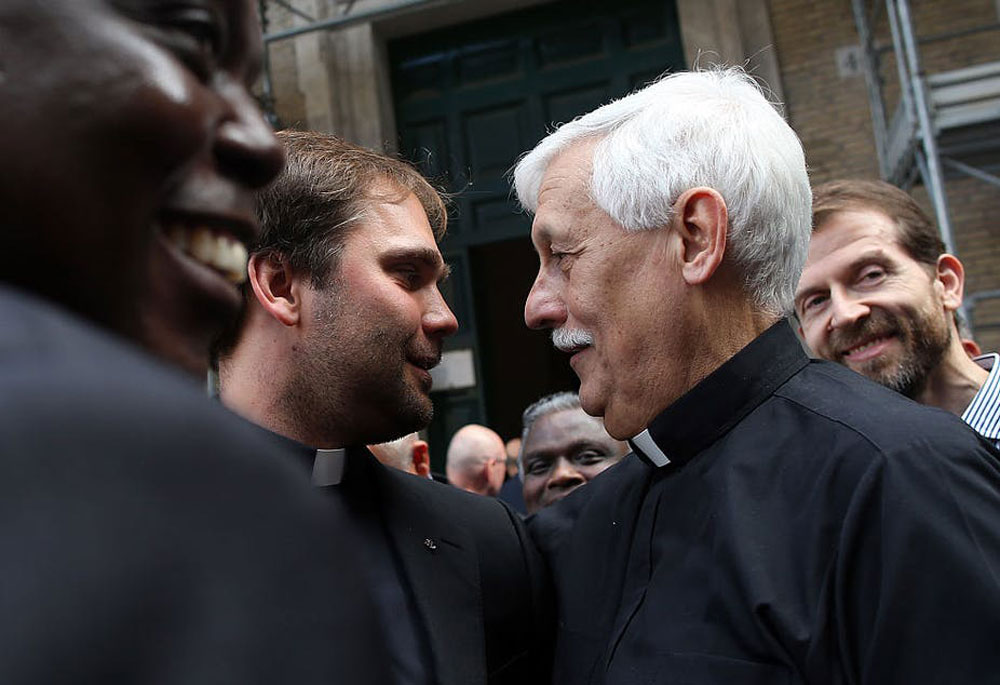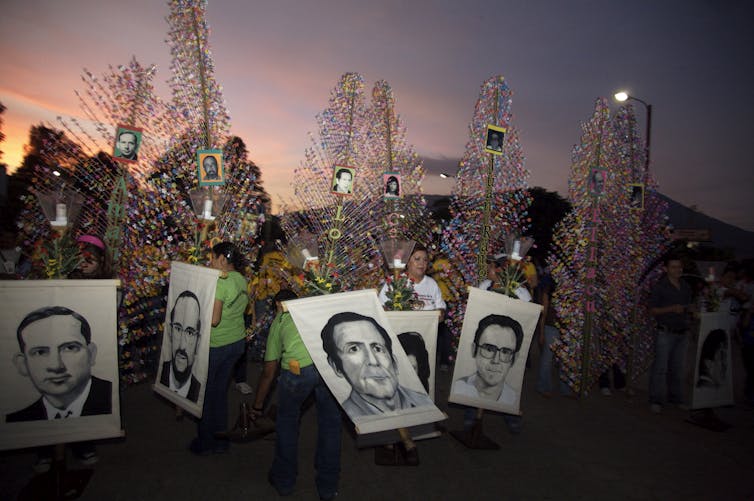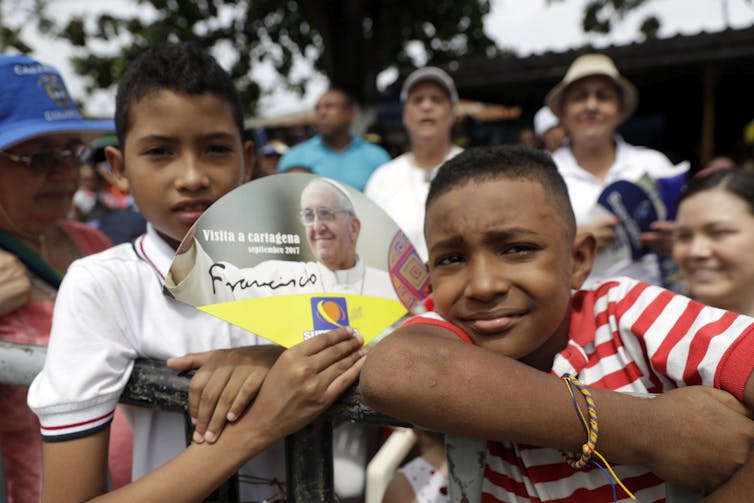
By Dorian Llywelyn
For centuries, the Jesuits have worn many hats: missionaries, educators and preachers; writers and scientists; priests with the poor and confessors to the royal courts of Europe.
I am a scholar of Catholicism and a priest who belongs to the Society of Jesus (more commonly known as the Jesuits) – often considered one of the Catholic Church’s most influential religious orders.
But the Jesuits are also among the church’s more controversial groups: They have sometimes run afoul of Catholic groups holding different opinions or church authorities, and they also have been accused of conniving in politics. For example, fearful that the order would interfere in American politics, Founding Father John Adams wrote to Thomas Jefferson in 1816 that the order deserved “eternal Perdition on Earth and in Hell.”
So who are the Jesuits? And what makes them distinctive?
Soldier to saint
In 1521, the Basque nobleman Iñigo López – known to history as St. Ignatius of Loyola – was seriously wounded in a battle against the French in Pamplona, Spain. Intense prayer over months of painful recuperation prompted a personal transformation that would lead him to found the Society of Jesus in 1534.
Ignatius compiled his spiritual insights into a prayer manual called the “Spiritual Exercises.” This book was intended to help people “seek and find the will of God” and guide them through a monthlong silent retreat.

Photo by Christophel Fine Art/Universal Images Group via Getty Images
While studying at the University of Paris, Ignatius gathered a small group of like-minded men whom he led through the “Spiritual Exercises.” They became the first Jesuits, soon electing Ignatius as their leader, the first superior general. By the time Ignatius died in 1556 there were some 1,000 Jesuits spread across Europe, India and Brazil.
One mission, many ways
Catholic religious orders generally require their members to take three lifelong vows: poverty, chastity and obedience. The additional Jesuit “fourth vow” is a commitment to being available to be sent to work wherever the needs of the church and the world are most pressing. Often, this means undertaking ministries in remote corners of the globe or in emerging fields of study.
Also built into the order is the desire to “seek God and find God’s will in all things.” This conviction has historically drawn Jesuits to many different areas of study, including mathematics and
and the sciences, and has sent them to far-flung places. Jesuit explorers mapped the Amazon River and discovered the source of the Blue Nile. Sixteen asteroids and some 34 Moon craters are named for Jesuit astronomers.
At a time when public education was scarce, they responded to that need and built a network of schools across Europe, Latin America and Asia. Their schools developed an innovative curriculum that incorporated rhetoric, the classics, the arts and science.
Education continues to be one of the order’s major emphases, with nearly 200 Jesuit-founded universities, and hundreds more high schools and educational projects across the world.
Lightning rods for controversy
Jesuits’ work has sometimes immersed them in controversies and criticism.
Among the best-known was the “Chinese rites” debate in the 17th century. Convinced that Christianity would spread more quickly if it adapted to local cultures, Jesuit missionaries in China incorporated elements of Confucian ancestor veneration into Catholic rituals. This move was bitterly opposed by Franciscan and Dominican missionaries, and Pope Clement XI banned the strategy in 1704.
The Jesuits’ close association with royal courts and the papacy made the order influential, but also vulnerable to opposition. Beginning with the territories of the Portuguese Empire, Jesuits were gradually expelled from all the Bourbon territories – areas that today form parts of Spain, Italy and France and their former empires – and the Habsburg lands of Central Europe. Bowing to political pressure, the Vatican formally abolished the Jesuits, and they had no official existence from 1773 until 1814.
Adapting to change, embracing justice
In 1965, Father Pedro Arrupe, a Basque who had spent much of his life in Japan, was elected as the Jesuits’ 28th superior general. At the time, the Catholic Church was implementing the teachings of the Second Vatican Council, adapting many practices to be more relevant to a changing world experiencing decolonialization, Cold War politics and the shift in Catholic population to the Southern Hemisphere.
Under Arrupe’s leadership, the Jesuits formally declared that a commitment to justice was essential to their order’s work. This development brought many Jesuits to take progressive stances in religion and politics alike. Jesuits in Latin America, for example, adopted aspects of liberation theology, which emphasized concern for the poor and oppressed: providing for people not only spiritually, but materially. Today, in the minds of many, Jesuits continue to be associated with more progressive and liberal viewpoints.

AP Photo/Edgar Romero
[3 media outlets, 1 religion newsletter. Get stories from The Conversation, AP and RNS.]
Like those in other Catholic orders, Jesuit priests around the world have been accused of sex abuse. A recent church report in Spain, for example, identified 96 abusers, most of whom had already died.
Meanwhile, more historical research is coming to light on Jesuits’ involvement with slavery. In 2021, the order pledged US$100 million for descendants of people enslaved by Georgetown University in the 19th century and for racial justice initiatives.
Pope Francis and the future of the Jesuits
The prospect of a Jesuit pope was once considered unlikely, given tensions at times between other church leaders and the order. Therefore, the 2013 election of Jesuit Jorge Bergoglio as Pope Francis surprised many, and his papacy has continued in that vein.
Pope Francis has been alternately hailed as a modernizer welcoming of LGBT Catholics and criticized for insufficient responsiveness to the clerical sexual abuse crisis.
Vatican observers note some characteristic Ignatian emphases in Pope Francis’ priorities, language and management style, including more attention to the poor. He has stressed the need for considering all sides of an argument when making church decisions and has shown a pragmatic willingness to consider new approaches.

AP Photo/Ricardo Mazalan
Future Jesuit emphases will continue to evolve as the order adapts to new circumstances. But it is the “Spiritual Exercises” that remain the heart of the identity and mission of today’s 17,000 Jesuits.
Dorian Llywelyn, President, Institute for Advanced Catholic Studies, USC Dornsife College of Letters, Arts and Sciences
This article is republished from The Conversation under a Creative Commons license. Read the original article.
![]()
Dorian Llywelyn is President of the Institute for Advanced Catholic Studies, USC Dornsife College of Letters, Arts and Sciences.





























Marlee says
The Jesuit teaching promotes Critical and Independent thinking…a very rare
asset these days!
bob says
and it was the Jesuits that until the 1950s documented Native Americans as SAVAGES in their teachings and reports